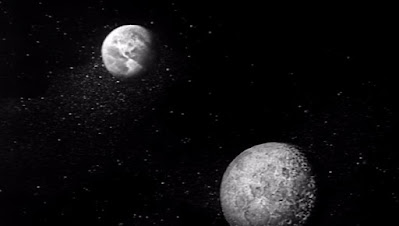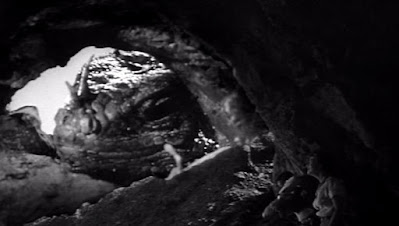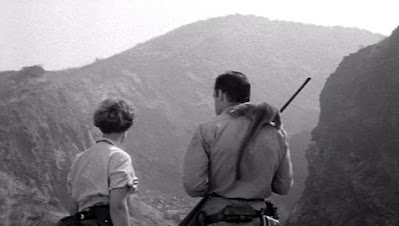1955
Directed by Bert I. Gordon
Written by Tom Gries, Al Zimbalist, and Bert I. Gordon
Bertram Ira Gordon—the man who'd grow, and grow, and grow, into the legendary Mr. B.I.G.—was born a little more than a century ago, in 1922; before he died this March, he achieved the fullness of that century, for Gordon would do nothing of normal size, including the act of being alive. The length of his movie career depends on how you define "movie" or, for that matter, "career," but it's not an unreasonable accounting to say he spent 60 years working in feature films, starting with 1954's Serpent Island, on which Gordon served as co-screenwriter, cinematographer, and editor, so if Tom Gries got sole directorial credit, it's easy to call Gordon its co-director anyway; his final film, Secrets of a Psychopath, was released almost exactly six decades later in 2014.
Nevertheless, Gordon's legacy is bound up principally—not exclusively, but when I say principally, I mean it's almost everything he's actually famous for—in the tiniest sliver of that span, really just two years, 1957 and 1958, during which he knocked out a run of classics, semi-classics, and bad-but-memorable sequels to classics, all on the theme of size, namely Beginning of the End, The Amazing Colossal Man, Attack of the Puppet People, War of the Colossal Beast, and Earth vs. the Spider. (Okay, maybe only one is a classic, but those titles are classic.) If we desired, we could expand our ambit a little, to include the whole period in which he was working totally in science fiction (and in bigness), and backdate the beginning of Gordon's Golden Age to 1955. That's when he released his credited directorial debut, King Dinosaur; and I suppose it's fair to admit that King Dinosaur is as well-remembered as anything Gordon ever did, there's just nothing positive about that memory.
But let's back up a little more. Gordon came at Hollywood obliquely: a long-time home movies enthusiast, after serving in World War II, Gordon married Flora Lang, and with the advent of the new technology of television, the two began a home business in the Midwest making TV commercials for local broadcast. Though a pioneer in that field (I haven't seen any of the Gordons' commercials, if any survive), Gordon was not satisfied with this lot. Ambitious to make real movies, he and his wife upped sticks to Hollywood, something Gordon in later years described as foolhardy and stupid, impressed with his own incredible luck that he did, after a fashion, make it.
A "Tom Gries" film or not, Serpent Island is quite Gordonian, albeit in the pejorative sense. It's close to not being a real movie: it's a creature of someone who'd learned montage on cheap regional TV commercials, and it's more a work of film collage than it is, clasically speaking, film editing, more-or-less just a collection of frequently-disjoint shots of people and landscapes and stock footage, tied together as much by voiceover narration (sound recording was clearly also a difficult hurdle for Gries and Gordon) as it is by anything resembling continuity. It's a little adventure movie about a broke heiress's doomed quest to retrieve her pirate ancestor's gold from its current custodians in Haiti (it eventually also has a snake), and it's less racist than this logline indicates, so it's got that going for it, plus to some degree the channels the storytelling gets forced into render it as a more interesting narrative object than it should be. It's something you might call an illustrated audiobook, with our protagonist narrating over somewhere between one-third and one-half of the runtime. It becomes ever more collage-heavy as it goes on, intercutting action with footage Gordon either captured or borrowed of a Haitian voudon ceremony, despite the fact that the former thread is at night and the latter, day; it bottoms out when Gordon accidentally splices a couple hundred frames of footage from the previous scene into the climax. It's bad, then, though as it's practically a student film, one can be somewhat indulgent about it.
Yet it's more of "a real movie" than King Dinosaur, which still replicates many of Serpent Island's technical problems even if Gordon's gotten "better" at his craft, and even if it serves as Gordon's calling card as a special effects man. As far as those effects go, Gordon remains more of a hobbyist than even a bottom-tier professional. (I think it's reasonable to assume Lang helped him, as she often would be credited as doing later, but she's only credited here for wardrobe, which means precious little more than lending a couple of pairs of culottes to the actresses portraying our lady astronauts. By no means is it my most salient criticism of King Dinosaur, so it's unfortunate to start out with it, but it is surely a criticism that this movie equates "action and adventure in space" with "culottes.") Theoretically, this was an industrial upgrade for Gordon. It was distributed by Robert Lippert, whose outfit would release sci-fi films at least as good as Kronos, and had already released sci-fi films at least as good as Lost Continent, and, yes, I hear myself. But if we're comparing that cheap-ass Mesozoic beast movie to this cheap-ass Mesozoic beast movie, Lost Continent actually does look good, and certainly comes off more like a legitimate Hollywood production, rock climbing and all. In practice, anyway, Lippert only seems to have come in on the distribution end of things. If Gordon's actual executive producer (and, portentously, a co-writer along with Gries), the infamous Al "Robot Monster" Zimbalist, did mean a step up for the aspiring filmmaker, there were still about 999 steps left to take before Gordon reached even as far as AIP.
Altogether, it feels like an actual step back: Serpent Island at least feels like it was made by adults who didn't know what they were doing. King Dinosaur is the kind of movie you wouldn't be proud of your thirteen year old for making, so that you'd still criticize his storytelling and all sorts of aspects of his scenario, and of course you'd feel a powerful need to have an unpleasant discussion with him about animal welfare.
It's still got that collaged feel all throughout, though for the first six minutes and thirty seconds of this 63 minute film—that's the very first moment one of the four actual actors in King Dinosaur appears on screen—it's nothing except collage, literally every frame some piece of stock footage or another except for ten or twenty seconds of special effect paintings used to indicate the startling situation that prompts our story, in which a new planet, dubbed "Nova," has slid its way into orbit around the sun nearby Earth. Well, an actor may appear at that point, and we start getting some other images actually created for this movie, but the dialogue-free collage of stock footage and special effects nonetheless continues for about eleven minutes, as the narrator that accompanies this sequence, radio announcer Marvin Miller, breathlessly explains that the governments of the Earth are scrambling to put their flags on the new world. Naturally, we follow the American effort, Miller informing us of the scientific, political, and engineering efforts taken, using adverbs like "underneathly" and describing the endeavor to put men (and women) on Nova. I should admit here that it's difficult to even summarize the plot of King Dinosaur without falling into sneering. Hell, even its Wikipedia article sneers.
And thus, six to eleven minutes of stuff of varying degrees of relevance—there's a surprising amount of talk about "turbojet engines" given the vacuum of space between Nova and Earth, quite probably a result of Gordon simply wanting to use jet engine test footage (and it's true that either the blazing wonder of an unhooded turbojet, or the curiously surrealist visual of two Army dudes gazing skyward on a two-person telescopic appartus, is indeed probably this film's most interesting shot)—but eventually we get rocket stock footage, sometimes put in reverse, and a crudely-matted V2-descendant making landfall somewhere around Lake Arrowhead, I mean Nova, depositing our quartet of scientists on a virgin world. These are Ralph Martin (William Bryant), who's a zoologist or as Miller would have it, a "zoogeographer," and, accordingly, I guess, the leader (I don't even know who flew the rocket); Patricia Bennett (Wanda Curtis), who's a geologist; Richard Gordon (Douglas Henderson), who's a medical doctor; and Nora Pierce (Patti Gallagher), who's a chemist. Unaccountably, they appear to have each paired off into a romantic relationship that may have predated the mission or may have sparked on the way here, though none of it is really dwelled on enough to explain itself. I don't know why I bothered with their specialties, by the way: there's the occasional stray line that recalls they're here for particular brands of research, but it doesn't even really matter that they're generically "scientists," and when the medical doctor is the one who gets severely injured there's not so much as a hint that this is supposed to be ironic.
Nova's earthlike—rather so—and while everything up till now has been substandard, it's been substandard in a half-charming slapped-together 50s sci-fi sort of way. But the instant Nora and Richard take off their spacesuits—maybe it's Patricia and Ralph, it isn't important—King Dinosaur degenerates completely into what might as well have been a movie about four extremely-unprepared and helpless people going on an ill-fated camping trip. They wander around Nova and observe its native life, which presently is just a bunch of stock footage of Earth life, and fairly boring Earth life, at that. Somehow, they get lost, and wind up having to take refuge in an improvised shelter—sticks leaning on each other with some leaves sort of tastefully arranged around them—and after some misadventures with "Nova's" more quotidian animals, they explore, at Patricia's insistence, the island that the "vultures" (crows) seem to find so fascinating, probably because it turns out this is an island with carnivorous dinosaurs. Which is to say an iguana, a small alligator, and a monitor lizard, but also an armadillo, and the mammoth from One Million Years B.C., from which King Dinosaur draws both its inspiration and morality. There's some peril indicated by the composited images of the iguana and alligator getting shoved into one another till they start biting—it's very despicable, and let's just say everything I wrote about 1960's The Lost World applies here.
It's all psychotically unexciting: only the last fifteen minutes have any sustained action, and even it's not any good, being both ugly and wrong and beholden to the limits of Gordon's technique, so that somehow the movie's whole reason for existence feels like padding, the humans accomplishing little besides, like us, observing a zero-dollar action scene. And this is the most exciting stuff: everything beforehand is just swill, our foursome wandering aimlessly around locations where distance shifts at random so that one scene's five-minute walk is another's two-day hike, with actors so disengaged or bad that Bryant, for instance, forgets to put a comma into the phrase "start the test, Dick." There are action beats, I suppose, like Richard battling a (rubber) alligator, for reasons not especially well-communicated by the editing. He also shoots a giant bee (that is, a double-exposed bee that winds up a black splotch on the screen, its identity conveyed more by buzzing than by imagery) and considers this so unexceptional he doesn't mention it to the zoologist. In between, he's "severely injured," but that's okay because after a good night's sleep he's ready for more random encounters.
I'm getting lost in the infernal details, and that's a mistake: this isn't a story, but gracious, this isn't even "just stuff happening," it's stuff that doesn't appear to actually happen because very little actually links in a causal way with anything before it or after it (or even on the screen with it!), and what does seem to "actually" happen, only happens because the characters are either oblivious morons, or actively violent. They're not even nice to the kinkajou they capture and make a pet out of, but then, the way Bryant picks it up and swings it by its tail is only a particular case of what an asshole he's being throughout, and I do not use the actor's name here by accident: I don't know if the guy hated this movie or being outdoors or what, but he's mean, on no fewer than three occasions coming close to hurting one or the other of the two women because he's flailing around with negligent anger, and only in one of these instances is this an emotion so much as suggested by the script (a script that gives him bipolar reactions like "It's nobody's fault—WHAT WERE YOU EVEN DOING OUT OF THE CAMP?").
It's so disordered details don't matter; I even wonder if that's why it's a mediocre MST3K episode, for despite a strong short subject and some choice host segments ("it's all hot and it hurts and stuff" is born here, I believe), it's only a modest feature riff. But, anyway, there is that one big detail, and it confirms what kind of film or film-like object we're watching: on their rescue mission, Richard and Nora have dragged the atomic battery along with them, and we know what that must mean, because Miller set this up in his narration, lo an hour of terrible movie ago. And yes: upon their escape from the dinosaurs, they arm the device for an overload. And I cannot overemphasize—I cannot really even properly describe—how arbitrary and pointless this is. I feel like even discussing it is belaboring the obvious. But it's not even a matter of some twisted moral message here. This is not some alien race presenting some nebulous threat by being different, which our mighty scientists decide to vanquish in disproportionate retaliation for the rude welcome they got. These guys got attacked by some animals, and elected to incinerate their entire habitat with an atomic bomb after they got away. This is not even the part that makes me furious. That comes after our scientists have barely escaped the blast zone—because to secure "cinematic tension" while they did this arbitrary, pointless thing, they set the timer to an arbitrarily, pointlessly low countdown—and they look back at the stock footage of a mushroom cloud. "We've done it," one says. "Yeah, we sure have done it," another replies, bitterly. "We've brought civilization to Planet Nova." And just no: how dare you try to put, like, commentary and irony into the mouths of these characters?
There are stupid Gordon movies; there are bad Gordon movies; this is the only one I know that feels like it's stupid and bad out of malignant purpose. It feels like the only goal here was to put a product into the marketplace that, however defective, technically still checked the boxes of "alien planet," "dinosaurs," and "atomic blasts" and at the lowest possible budget, therefore earning a sound return on investment once the smallest, dumbest, most gullible children went to go see it anyway. There is not any other Gordon film so contemptuous, and, frankly, I assume this is Zimbalist's contribution. I'm glad Gordon clawed his way out of Z-grade hell—The Cyclops sucks, but that movie's shoestring adventurers remembered to bring the fucking tent that this movie's astronauts forgot—yet if it were my decision in 1955, I wouldn't have given him another dime, and done my level best to send this shitmonger straight back to Wisconsin.
Score: 0/10
(and, for the record, the score for Serpent Island: 3/10)
That which is indistinguishable from magic:
- So a rogue planet just wanders around in interstellar space with a lush biosphere, slots right into an orbit around our sun, and Earth isn't just not ejected from the solar system, it's not even perturbed? Do I have all that right?
- There's a bit where these brave explorers remark that they don't actually know when night comes on Nova, and what's galling is that you can tell Gordon and his co-writers think they're being smart to note this. But all that means is that the single most easily-ascertainable datum about Nova—its rotational period—wasn't established before we sent people to it.
- Leaving aside that evolutionary and geological periods are not teleologies that all planets go through—that kind of philosophical objection is tangential to the far more serious ones here—the level of scientific literacy of King Dinosaur is summed up in the dialogue where one of them asks what part of Earth's past Nova recapitulates, and the other just answers "prehistoric."
- Or maybe it's summed up by the assertion that active volcanoes are sign of a "young planet."
- Of course Gordon uses the Los Alamos stock footage with the tracer rockets, because I'm sure those would've been on Nova, dinosaurs are very interested in measuring shock wave propagation.
- A nuclear battery (or even if we assume this is a nuclear reactor) is not, in fact, the same thing as an atomic bomb.
- "It resembles a tyrannosaurus rex of Earth's prehistoric age":
The morality of the past, in the future!:
- You know, I've noticed a certain correlation between "the presence of so-called slurpasaurs" and "candidates for the worst movie ever made."
- Just from the evidence of the footage already in the film, I think you could make out a case for battery against Bryant, and it'd be sounder than negligent homicide for Alec Baldwin or whatever.
- This movie conceives of animal control as a key mission of our strategic nuclear forces.
Sensawunda:
- Shockingly, not absent, but it's all in that opening montage, simply because mid-century high-technology is always pretty cool.






No comments:
Post a Comment